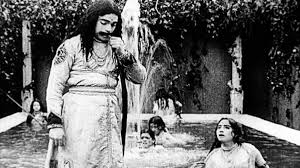Ban On Indian Movies In Pakistan: A Way Forward For Pakistan’s Film Industry

Ban On Indian Movies In Pakistan: A Way Forward For Pakistan’s Film Industry
Introduction
It is said that art and talent has no boundaries. Movies are a modern form of performing arts and the mastery, culture, societal values and demographics of particular societies are being shown through the movies. Movies are considered to be one of the finest forms of entertainment to the masses. And globalization has enabled the world to have access to movies of different countries. With Hollywood and Bollywood being most watched the world over. But due to political and military rivalries, some countries impose ban on the content of their rival country.
Indian movies have a huge market the world over and Indian movies are watched in every part of the world. Pakistan also has always been influenced by the movies produced by India-our neighbor since 1947, and even before independence, the masses used to live together in the subcontinent-despite the fact that both countries could never have prosperous and healthy relations. But due to their history of living together, people have common taste regarding movies and music.
Pakistan and India have been at daggers drawn since their very inception. Having two major wars, countless number of attacks-both militarily and diplomatically- several serious feuds including water issue and most importantly the Kashmir conflict, all these rivalries could never be resolved between these countries. All these issues could never let the countries be at same page for peace and have prosperous relations with each other.
The routine matters like trade, commerce and media activities were kept continued amid all these tensions between the two countries. But some major incidents caused both countries to take serious steps and impose bans and sanctions on these bilateral activities. These incidents will be discussed shortly, but first let’s have a review of subcontinent’s media industries and their presence across the borders.
Historical Background of Indian and Pakistan’s Cinema
The art of producing movies dates back to 1913 in Indian subcontinent when the first movie Raja Harishchandra was released. The industry kept on growing and new technologies were introduced with time and within a short span of almost 20 years, the first talking movie Alam Ara was released in Indian subcontinent. Before partition, the film industry had three hubs Lahore, Bombay (present Mumbai) and Dhaka and Indian film industry was flourishing since then. After partition, the Indian industry kept itself on a growing track.

Image Source: India Today
Raja Harishchandra
On the other hand Pakistan’s first film was produced in 1930 Husn Ka Daku in Lahore. After Independence, however, serious challenges were faced by Pakistan’s film industry like lacking infrastructure, finances and latest technologies to cope up with the challenges.
But the 60s and early 70s eras are considered to be the golden ages of Pakistani cinema. At one point quality movies were being produced by the industry along with several new faces being introduced and these new comers soon became the rulers of the industry. Muhammad Ali, Waheed Murad, Nadeem Baig are some of the names who became famous in the said era. Famous movies include Azra (1960), Armaan (1966), Chakori (1967).

Image source: Citizen Archive of Pakistan
Bans imposed on Indian Movies
On the other hand, after 1965 war, Indian movies were completely banned in Pakistan, and this gave another opportunity for Pakistani movie makers to produce good movies and cash the chance.
This ban continued for almost 40 years. In all these years, several ups and downs were faced by Pakistani movie industry and eventually was left in a misery. The political situation of that era-Zia’s islamization regime- can be blamed for the decline of film Industry. In 2007, however, the ban was lifted by the then PM of Pakistan Pervaiz Musharraf, and the cinema industry was given a chance to get back on the road of success.
Since then, a major chunk of screens in Pakistan was being held by the Indian movies because no quality content was produced at local level for the cinema lovers. One factor for the rise of Indian movies in Pakistan could be pointed out here that the content produced at local level was far beyond its competitor (i.e. India) and lacked the innovation in storytelling techniques, performances and music scores. There came a time when low budget low quality movies started to hit the cinema screens and most of them used to be Punjabi movies. The movies lacked strong narratives, good music and impactful performances. All of them were mostly based on poor quality action, sub-standard production techniques and vulgar songs.
As Indian cinema was constantly producing quality movies and was investing a lot in the movies, the audience ultimately shifted to Indian content. So Indian movies can’t be blamed for taking away the major opportunity from the local producers. Indian movies were banned for 40 years long, If Pakistani film industry had flourished well, the Indian content wouldn’t have been able to overtake its screens so quickly.
After almost a decade, in 2016, a tumulus situation was witnessed when the Uri attack in occupied Kashmir happened. It was an attack on Indian army, and India was raged over it. Evidently, Pakistan was blamed for the incident, thereby soaring the relations between both. The tensions grew and Pakistani artists were completely banned from the Indian film industry. This was an act done to show its rivalry with Pakistan. Pakistan answered in a same way and Indian movies and TV content was banned completely in Pakistan. Similarly Pakistani content was also banned on Indian TV. As many Pakistani dramas were exported to Indian channels. Before this situation, Indian content was widely watched by the Pakistani audiences.
But this ban couldn’t be sustained longer and the self-imposed ban was lifted by the Pakistani cinema Industry as there were hardly good productions at home and the cinema owners were getting in hot waters.
The situation was changed again, when as on 28th Feb. 2019, India tried to intrude into Pakistan’s borders and was taken aback by the retaliation by Pakistan Air force. This was a serious clash which graved the countries’ relations. Resultantly, Indian content was banned to show solidarity and patriotism for our beloved country Pakistan.
Pakistan has always tried to pave the way for healthy relations with India. Several peace initiatives were taken by Pakistan in this context. Lifting the ban on Indian movies after 40 years was one of them. After that, several activities of cultural and art exchanges were continued between both countries. Several Indian celebrities visited Pakistan and Pakistani artists like Meera and singers like Rahat Fateh Ali and Atif Aslam going to India and working in their movies. But our artists never received a warm welcome from Indian side.
Now the question arises, how this ban can be utilised by Pakistani film and cinema industry to advance its calibre and get into the race of producing quality movies for the masses.
Current Situation of Pakistan’s Film Industry
There are on average 160 cinemas in Pakistan with 59 being in Lahore. In 2019, Pakistan film industry produced 23 movies. Excluding the Pashto and other local language movies. Even if these local productions are included, there isn’t enough movies produced to cater the regular demand. It is argued by the film fraternity that cinema can’t survive with this number of movies.
In the absence of a giant Indian movie market, Pakistan industry needs massive film productions not only to keep the industry at break even, but also help the cinema owners to retain and maintain their businesses. The movies produced by far, also do not manage to earn and stay on screens for a longer period. Thus, except for Eid occasions, the theatres stay empty most of the times throughout the year.
Why our generation needs to watch Indian movies and why our cinema industry requires Indian movies to run business in a successful way. The answer to second question lies in the first: that there has been an eternal admiration for Indian movies by our generations ever since so as we say in Urdu –Jo Dikhta Hai Wohi Bikta Hai– goes well for this scenario. And besides the ban, Indian movies are watched by the masses through pirated versions.
Our generations are being kept captivated by ever luring and indulging romances, relations, not so impressive action, and most importantly the songs and the celebrities of Indian film industry. Amid all the crises and threats India is posing on Pakistan, Indian movies would be watched by the Pakistani audiences at any cost, totally ignoring the grudges and hatred the Indian government has in their hearts for Pakistan.
What India has been doing in Kashmir for the past 73 years and what’s she doing in her own country with Muslims, should be an eye opener for the people to realize the matter and stop admiring their content.
Instead, the local content should be fully supported and the masses must stand by their own industry and fraternity to help it to grow. Although there are flaws and the movies still have a long way to go, but there is always a start point and that’s the point one needs most of the support and encouragement.

Image Source: The Newyork Times
As per Indian reports, Pakistan only contributes mere 5-6 % of their total box office collections so for them this ban is no big deal. Thus our patriotism now requires to completely oppose the Indian content, not even online or through piracies. And fully support the local content. This not only will help the local industry to grow in a positive way, but also help the cinema owners to mitigate their losses which they have been facing since the ban.
Way Forward for Pakistan’s Film Industry
The huge responsibility also lies on the fraternity to thrive for the best and do whatever it takes to produce quality content. If we look at our drama industry, Pakistan produces one of the finest projects which are watched the world over. The same quality is required in movies. The film industry requires some serious reforms and investments. For this, government can also help by providing financial subsidies and other supportive measures so that the industry manages itself.
We need good and well written screenplays, strong stories, latest production techniques, strong performances, new and fresh faces and most importantly the support from the masses. If the cinema halls go empty on film releases, it will only affect our own industry.
Pakistan doesn’t need cross border movies to entertain its masses and run its business. A golden era -when Pakistan was making super hit movies- has been witnessed by Pakistan’s cinema industry in the past and it has the talent and potential to gain that position back. There is immense raw talent available in the country. All it requires is a vision, approach, opportunity, guidance and training. Pakistan has no training institutions for actors/singers.
In order to proliferate our media especially film industry, we require genuine and devoted efforts by all the stakeholders to create quality movies even at small budgets in the beginning. Because a good movies doesn’t require a big budget, but a strong story base line with powerful performances and better direction. And when a movie is produced, then it needs is a sincere and patriotic approach by the masses to show support towards the local content to help it improve.




